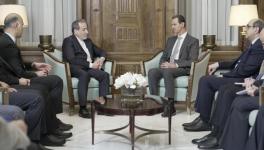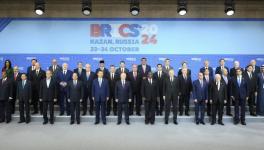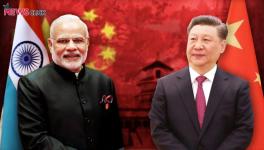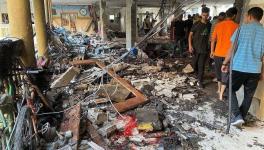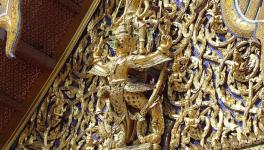Ancient Palmyra's Liberation: Beginning of the End of ISIS in Syria
Palmyra, with its ancient ruins and a UNESCO heritage, site has been recaptured by Syrian Government forces from Da'esh/IS. The victory in Palmyra has not only symbolic value, it also has enormous strategic significance for eastern Syria. This part of Syria is largely desert, dotted with only a few major towns. Capturing Palmyra, one of such towns, opens the way to link up with the forces in the town of Deir Ezzor, which have been under siege for more than two years. It will also cut Raqqa's links to Da'esh/IS's forces in Iraq, and allow a multi-pronged attack on it. Once Raqqa – the “capital of Da'esh/IS -- falls, their forces would be reduced to fragemented pockets that can then be mopped much more easily.
Capturing Palmyra has shown up the false narrative propagated by western powers and their media that the Syria-Russia-Iran-Hezbollah alliance was not interested in fighting Da'esh/IS. Their “story” was that the Syrian government and its allies were only fighting against the “moderate” rebel forces backed by the west, Turkey and Saudi Arabia. That these so-called moderate forces were under the leadership of the al Qaeda affiliate Jabhat al Nusra, and included other sectarian forces that could be called at best Al Qaeda lite, were sought to be glossed over. In their anxiety for regime change in Syria, the western powers were either in tacit or direct alliance with the most sectarian forces in the region. Afghanistan, Iraq and Libya seemed to have taught the US and its European allies very little. After inflicting series of defeats on these sectarian forces in Latakia and the Aleppo sectors, the Syrian Government and its allies accepted the ceasefire being discussed in Geneva. With the Russian entry and the clear failure of regime change policies in Syria, the NATO powers – except for Turkey – were in a rethink mode. The refugee crisis and the Paris bombings have exposed west's folly of supporting – in tandem with Turkey and Saudi Arabia -- Islamist sectarian forces,.

Image Courtesy: commons.wikimedia.org
The Geneva talks created an opportunity for a section of rebels to accept the proposed ceasefire, and work for an accommodation with the Bashar al Assad government. While the peace talks will be tortuous and long, it has helped clarify considerably the situation on the ground. We now have Al Qaeda – Jabhat al Nusra and its allies – and ISIS as the two major formations that are still fighting the Syrian government. The west and its “moderate” allies are grudgingly accepting that if they are to save themselves from complete destruction, peace with the Syrian government as their only course. The strategic initiative is now clearly with Syrian government and its allies.
Palmyra did not fall without bitter resistance by Da'esh/IS, who lost around 500 fighters there. This has been their biggest loss so far. This, and the earlier loss in Kobane against the Kurdish YPG forces, are the two major defeats that Da'esh/IS has suffered in Syria.
The Palmyra airbase can now provides close air support to the Syrian government forces marching towards Deir Ezzor and also control much of eastern Syria, including its southeast border with Jordan.
What has been striking in Palmyra, is the west's unhappiness with Syrian government forces success against Da'esh/IS. Speaking on Palmyra, the US spokesperson equated the Assad government with IS, and admitted grudgingly that Palmyra falling to government forces, was the slightly better of two almost equally bad outcomes. Having proclaimed that only the US and its allies were fighting against Da'esh/IS, the US has been hard put to provide any success, either in Iraq or in Syria. It was earlier shamed by Russia into bombing Da'esh/IS oil truck-lines to Turkey, and has been trying hard to convince the Kurdish YPG and its Arab allies to march towards Raqqa. The YPG is reluctant to do this, as capturing territory that is non Kurdish might then open up fissures between the Kurdish and the Arab populations.
Meanwhile, leaks from a closed door meeting of King Abdullah of Jordan with US lawmakers in January, substantiate what a host of websites such as Newsclick.in have always held – that Turkey is actively involved in using refugees against Europe, transferring terrorists back and forth between Europe and Syria, and in the Da'esh/IS oil trade. While the same accusations by Russia could be brushed off as “propaganda”, this comes now from a close ally of the US in the region.
The Syrian Kurds have met in northeast Syria and have put forward “A Project for a Democratic Syria”. Vijay Prashad writes about this proposal,
Neither the Assad government in Damascus nor the opposition in Istanbul likes the idea of a federal Syria. Both are drawn to the habit of strong central rule. But, as the Syrian Center for Policy Research in Damascus showed, the war has fragmented the country seemingly irreversibly. A fragmented Syria is the reality. This fragmentation can go in two directions. It can be used as an excuse to partition the country. Or Syria can be preserved as a federal republic. In Iraq, the US occupation allowed the Kurdish Region to be defined in ethnic terms, leaving the rest of the country to be also – de facto –seen in sectarian terms (Shia and Sunni). The Syrian Kurds have prevented this by suggesting that their region – Rojava – is not an ethnic enclave but a state in a federation that is committed to equality and democracy. They call this the Project for a Democratic Syria. That the participants at the conference that took this position are not only Kurds illustrates their vision. This is not, as Salih Muslim put it, a claim to secessionism. It is a way to save Syria from disintegration.
The Russians, unlike the US and its allies, have fought the Syrian war with limited aims. They sought to stabilise the legitimate government of Bashar al Assad, equip the Syrian forces with better arms and equipment, and provide air cover that the Syrian airforce could not. They did not involve themselves deeply on the ground, and have now withdrawn the limited ground forces they had provided. They have also engaged successfully with the western governments that a regime change agenda had now little chance of success in Syria and a peace on the ground needs to be negotiated with the Syrian government.
While the war in Syria is taking a course favourable to the Syrian government and its allies, the road to peace is still going to be long and hard. But at last, there are clear signs that the sectarian forces are now on the run. The Syrian government and its allies – Russia and Iran in particular – have to show on the peace table as much strategic acumen that they have shown on the field. This is the new challenge for Syria.
Disclaimer: The views expressed here are the author's personal views, and do not necessarily represent the views of Newsclick
Get the latest reports & analysis with people's perspective on Protests, movements & deep analytical videos, discussions of the current affairs in your Telegram app. Subscribe to NewsClick's Telegram channel & get Real-Time updates on stories, as they get published on our website.










